Firoza: the Backbone of Her Family
Sensational Afghan woman takes care of her family while being a mountain of support for her relatives despite life’s many challenges.

— One Day in Afghanistan —
Written by Shaima Seddiqi, edited by Mohammad J. Alizada, & Brian J. Conley
Alive-in is a not-for-profit media agency that mentors journalists from underrepresented communities to increase local and international understanding. Subscribe to receive our stories directly in your inbox.
ZARANJ — Regime changes, changes in the political landscape, and the continuous war in Afghanistan have left a heavy impact on women across Afghanistan. 40 years of war in Afghanistan destroyed all infrastructure and forced millions of Afghans to leave their homes.
Nimroz, a province in Afghanistan’s southwestern region bordering both Iran and Pakistan, is the gateway for illegal migration into both countries. Afghans from across Afghanistan travel through the province to get to these countries, and many of them return addicted to drugs.
Around 6 million Afghans are estimated to struggle with substance use and drug addiction. Afghanistan is also the largest producer of opium in the world. For more information about drug use and addiction to drugs, read Alive in Afghanistan’s Struggling with Poverty and Trauma, Millions of Afghans Turn to Drugs.
Addiction not only affects the men, but their wives and children, who are left to fend for themselves and deal with domestic violence and abuse at the hand of the users.
In today’s episode of One Day in Afghanistan, Alive in Afghanistan’s Shaima Seddiqi documents the life of Firoza Samozai, a 35 year-old woman who has to take care of her family of seven on her own because her husband, 39 year-old Qadir is unemployed and addicted to drugs.
Firoza has four children, 15 year-old Zahir, 10 year-old Nasir, 6 year-old Soraya and 1 year-old Suhaila. Zahir works in Iran and Nasir collects scrap plastic and metal to sell in order to take care of the family.
I leave home around 9 am traveling for 5 kilometers in the 42C degree heat (~107 degrees Fahrenheit) until I reach the Islamabad neighborhood of Zaranj city to find Firoza’s house. After knocking on the metal door held closed by a piece of rubber, a boy wearing an undershirt opens the door.
“My mother has gone to my aunt’s house where they are washing clothes today,” the boy replies after I ask him where his mother is. I ask him to inform his mother of my arrival, the boy puts on his worn out clothes and leaves the house to get his mother.
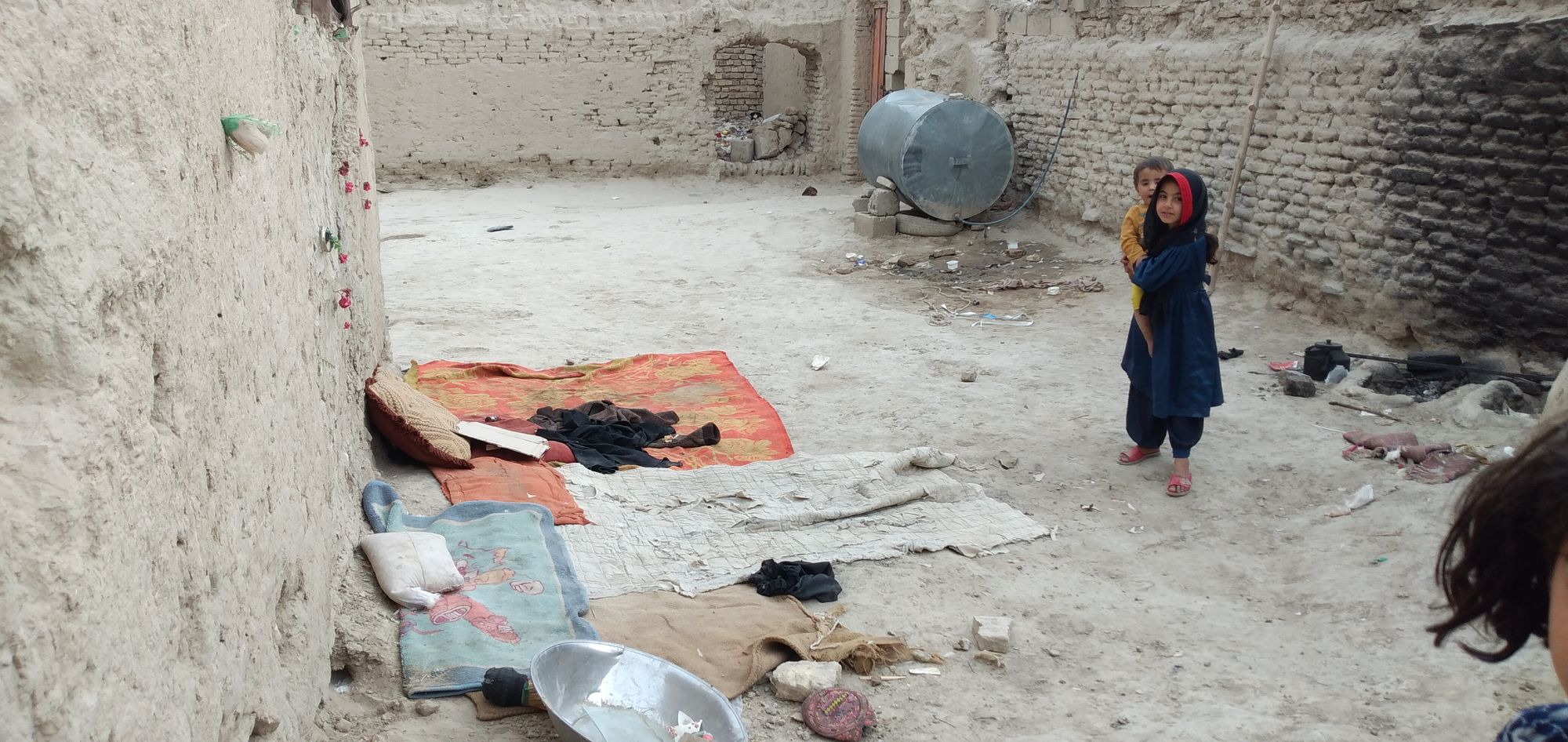
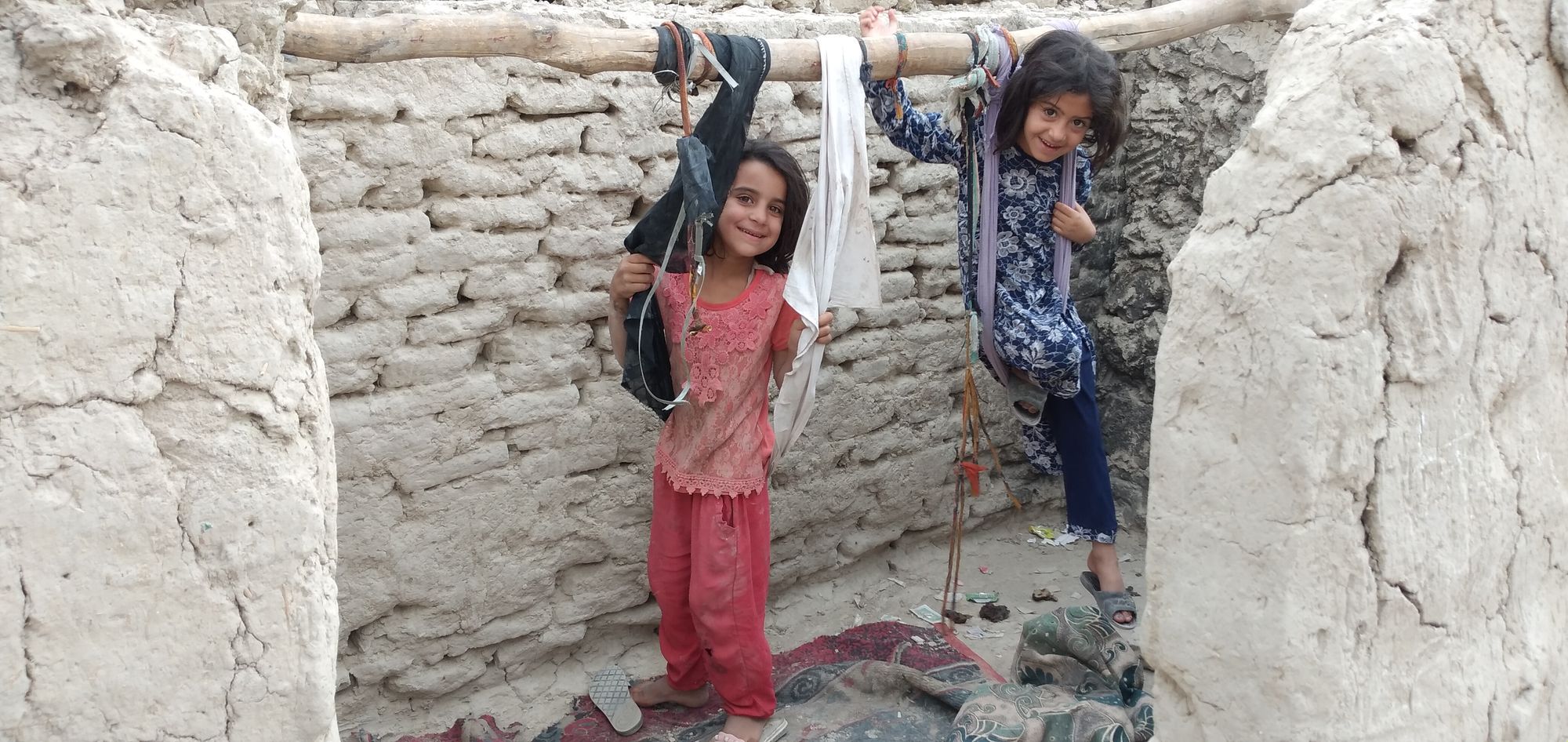
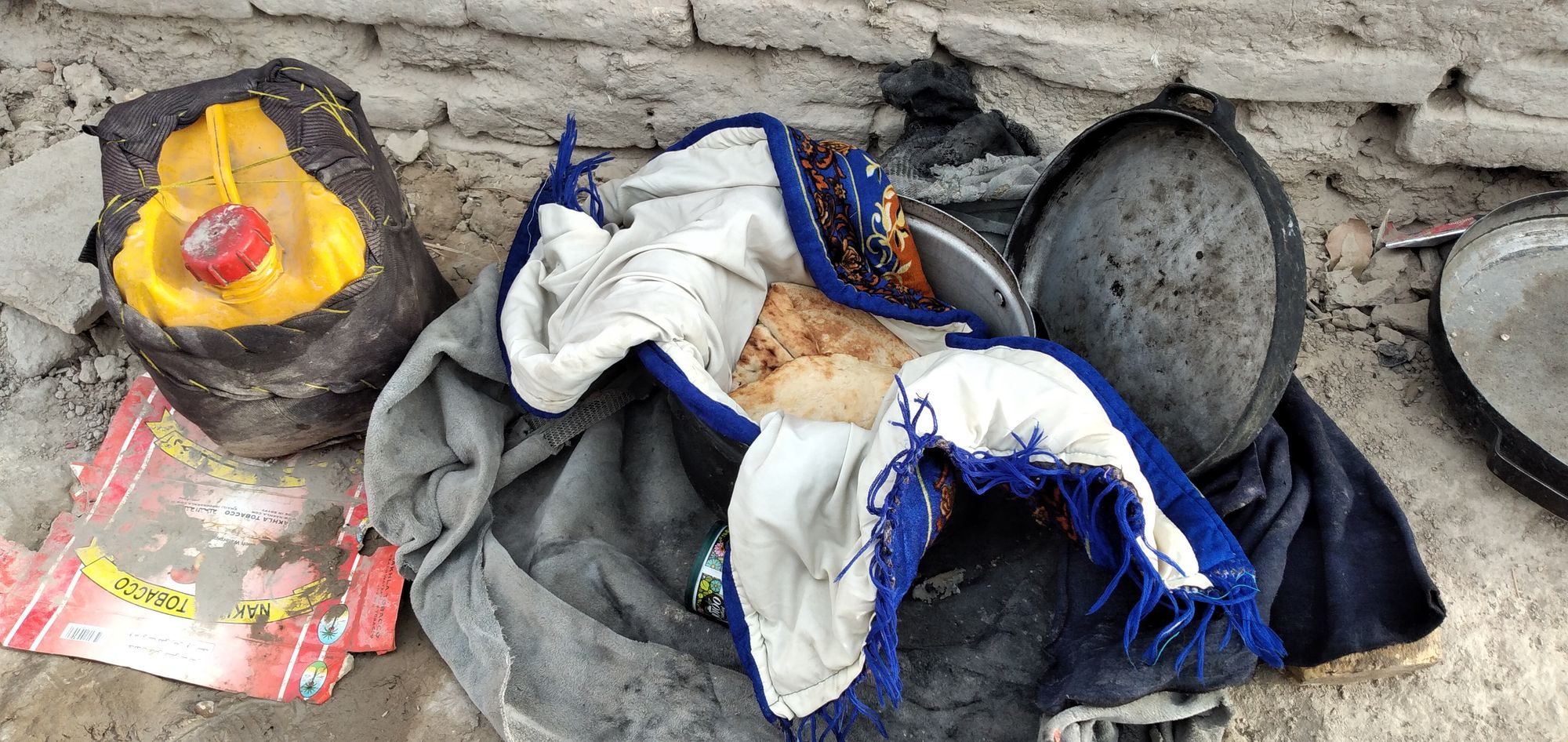
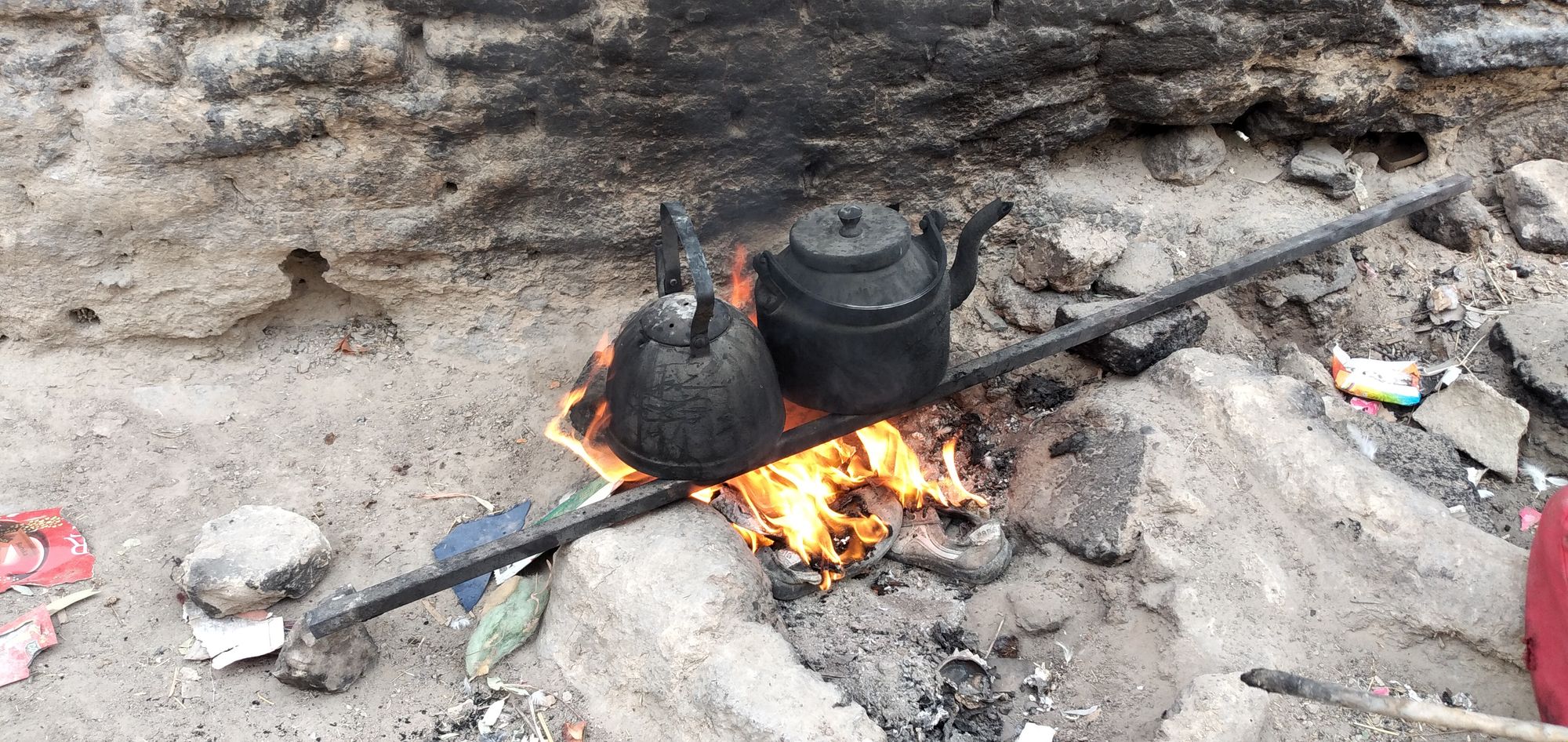
I decide to wait in the yard and take a look around rather than camp inside with the load of children that were buzzing around. Every corner of the dusty yard I explore is littered with feces, although I am wearing a mask, the smell still doesn’t escape me. There was a pile of animal feces near the entry gate, an open air room filled with garbage that serves as the family trashcan and holds a water tanker with an attached pipe. A little farther ahead, a traditional fire pit for cooking and an oven for baking bread sit near each other. As I walked farther along to see the two rooms that the family lives in, children used the rear of the building as an open outhouse, which really grossed me out. An outhouse at the end of the outer wall serves as a bathroom for the adults in the house. Firoza arrives as I return to take photos of the rooms that the family lives in.
The home looks more like an ancient castle than a place for people to live today. Only the outer walls are intact, creating two domed rooms, one with a window and the other with a hole in the wall that lets air inside. A family of mice scurry around the kitchen and into and out of pots and pans that are left on the kitchen floor which is covered by a dirty dark blue mat. The mice appear to have grown used to the humans that share their home. Firoza uses a small solar panel to charge a battery that she uses for light at night.
Firoza greets me kindly and asks me to sit in one of the rooms. She breastfeeds her daughter Suhaila before conversing with me.
Firoza was given as a badal, women and girls exchanged as brides between families, when she was a child. Her family married her off to Qadir 18 years ago when she turned 16, Qadir’s sister was then married off to Firoza’s brother. The family lived in the Adraskan district of western Herat province back then.
Henrietta Fore, the Executive Director of the United Nations Children’s Fund (UNICEF) said in a statement last year that the agency, “[E]stimates that 28 percent of Afghan women aged 15–49 years were married before the age of 18.”
“The extremely dire economic situation in Afghanistan is pushing more families deeper into poverty and forcing them to make desperate choices, such as putting children to work and marrying girls off at a young age[,]” Henrietta said.
Firoza and Qadir are originally from the Qala-e Toot village of Adraskan where they lived for four years after their marriage, working as farmers for hire. Their first child, Khurshid, was born in Adraskan but the continuous drought and unemployment within their district forced the family to move to Nimroz some 12 years ago.
The International Federation of Red Cross and Red Crescent Societies (IFRC) in a press release early last year said, “Severe drought has hit more than 80 percent of the country, cripping food production and forcing people from their land.”
When they moved to Nimroz, Firoza’s mother-in-law met a wealthy family in a market one day who connected them with other families needing help with a variety of house chores including cooking and cleaning.
Eventually Firoza learned that her husband had become addicted to drugs. However, Qadir was never treated nor went to rehab and living with him got harder as his addiction continued. Four of Firoza’s five children were born in Nimroz, the children were cared for by their grandmother while Firoza worked at people’s homes. But when Firoza returned from work, Qadir was violent towards her despite the fact that she paid for his drugs.
“I used to work and pay for his drugs but he kept selling our appliances and furniture for buying more drugs,” Firoza says, adding that she worked hard to earn money but her life never took a turn for the better.
Firoza is a very patient woman who has a smile at all times. She believes the hurdles in her life are part of her fortune, therefore she keeps smiling at life’s problems and thanks the almighty for granting her a healthy body and the ability to work.
Firoza’s life continued like this until her mother-in-law passed away three years ago due to a heart attack stemming from continued stress about her children’s lives–two of her sons were working in Iran to make money for dowry – a bride price – and one, Qadir, was a drug addict.
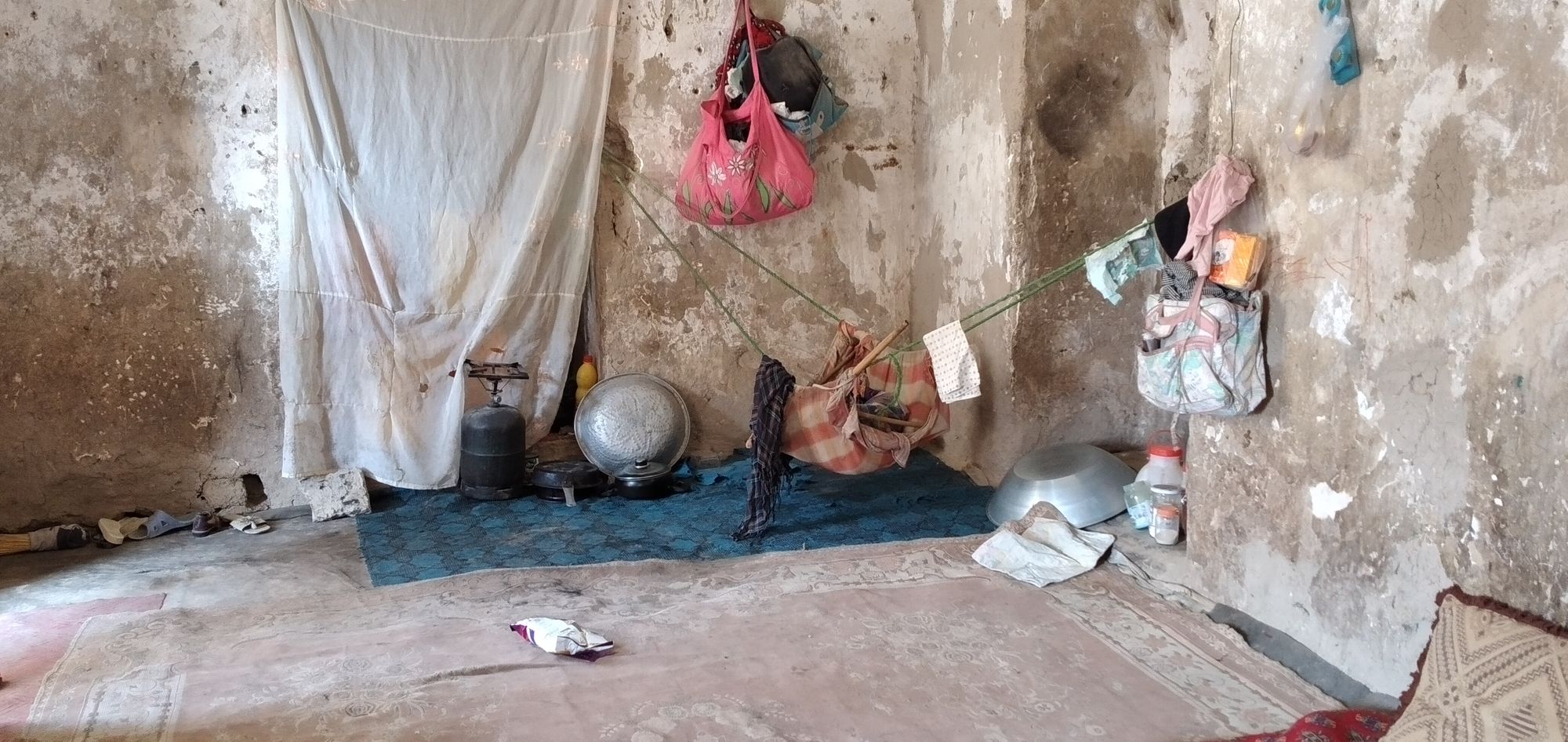
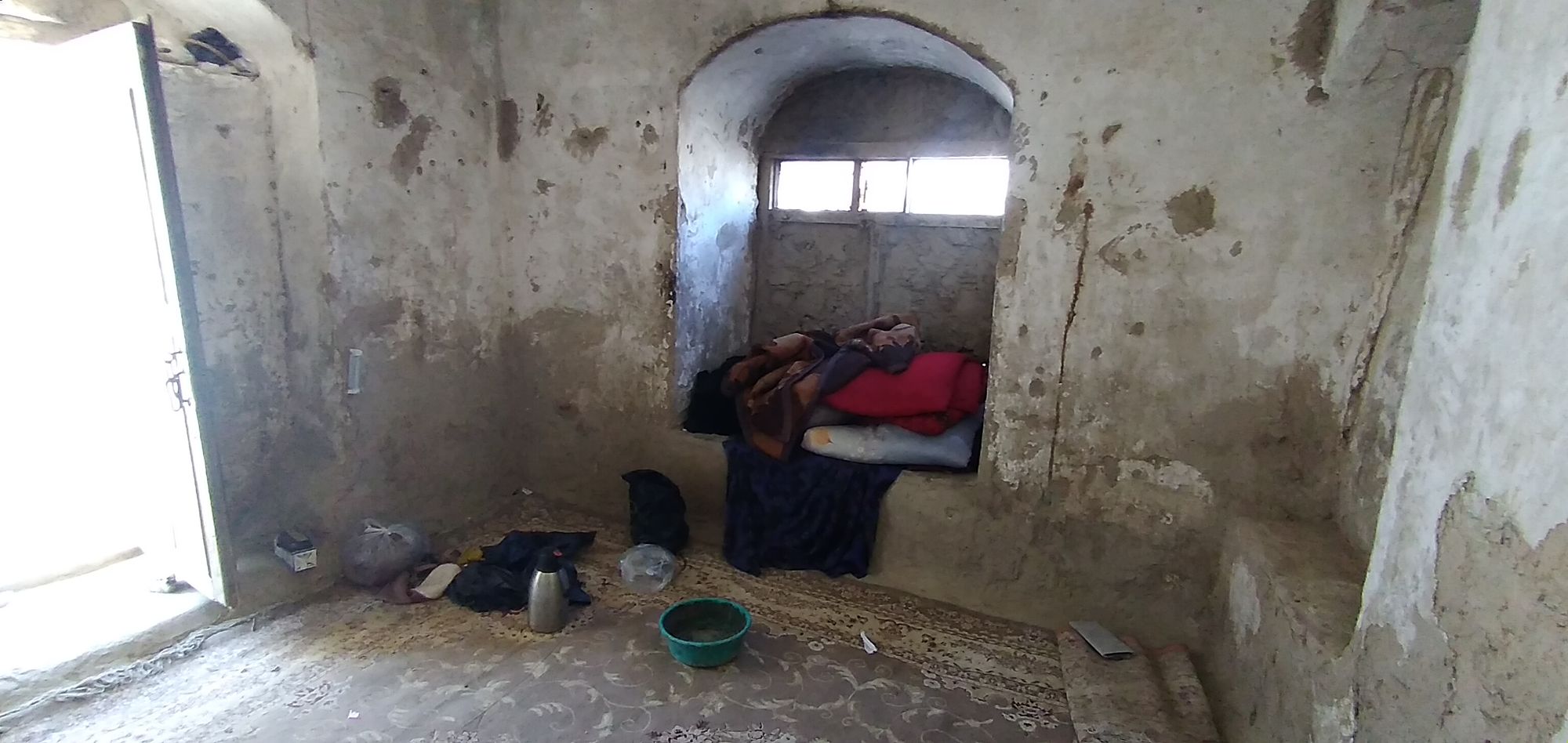
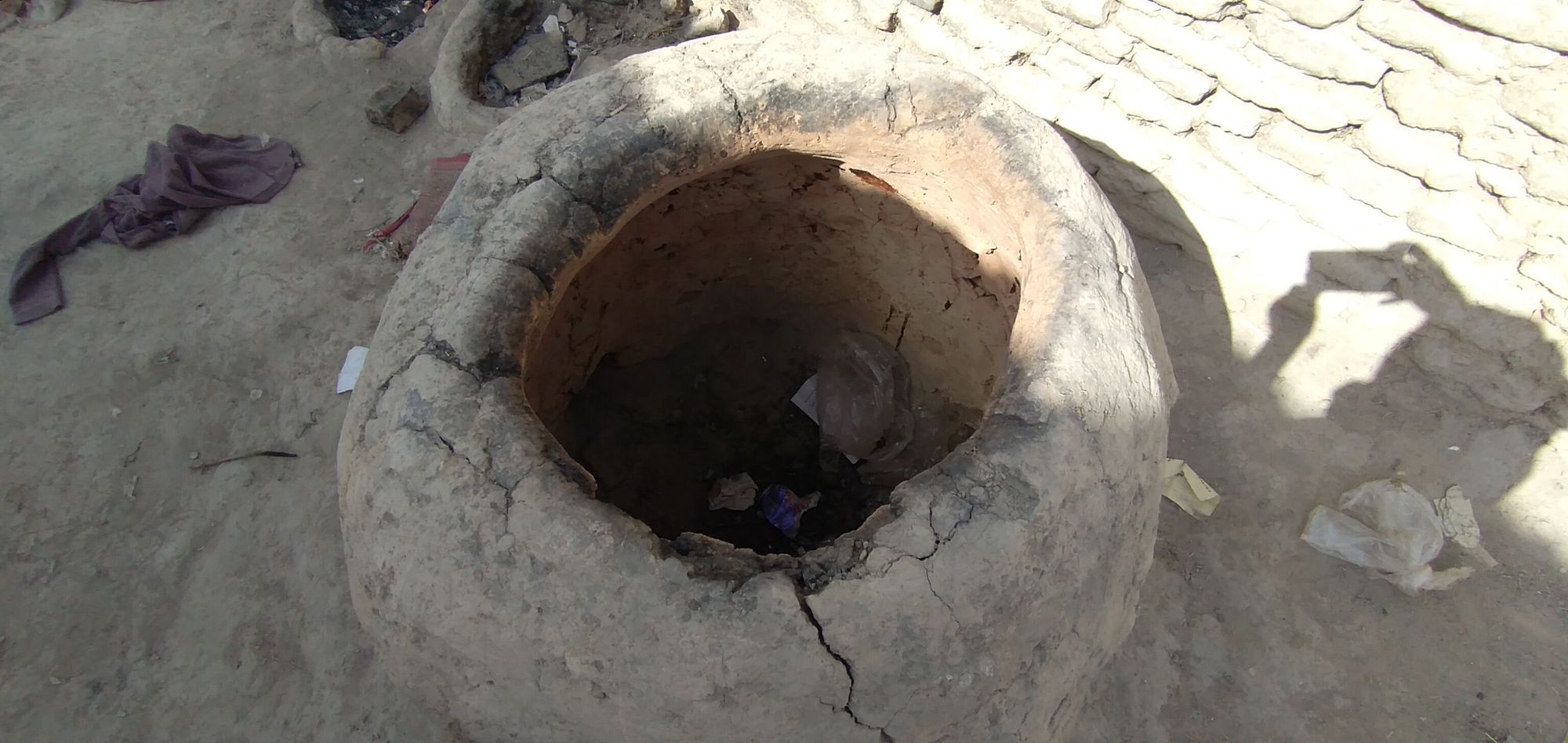
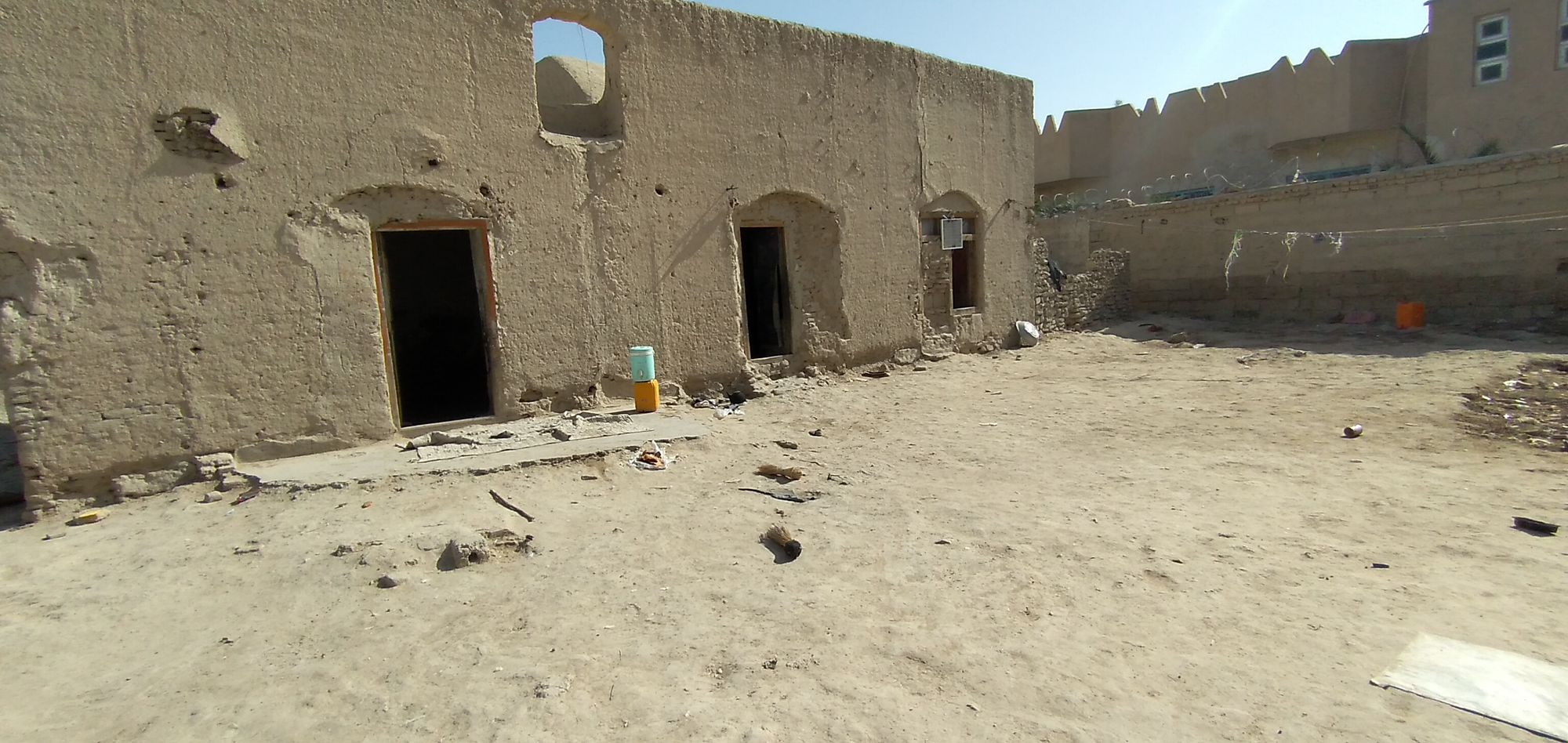
Life got darker for Firoza after losing her mother-in-law because she was forced to become the head of her household without anyone to take care of her children while she worked. After a while her brother found out that Firoza was earning an income by working at people’s homes, following which he moved his family of seven from Adraskan and joined her in Nimroz.
Her brother and his wife, together with Khurshid worked at people’s homes until Firoza had to marry off her daughter two years ago due to poverty. But Khurshid’s fate and future was also decided when she was an infant; she was slated to marry one of her distant cousins. Now Firza takes her nieces, 12 year-old Parwana and 15 year-old Farzana for labor so they can take part in providing a source of income for their family.
Since the people of rural Afghanistan are victims of abject poverty and illiteracy, unwanted customs, including badal, child and forced marriages, have become a tradition.
“We are a poor family, we are not able to afford dowries so we marry our girls using the badal tradition. Parwana is already given away to a 7 year-old boy who is blind in one eye and is a cobbler in Adraskan district. In exchange for her uncle’s wife, Farzana has been committed to marry the son of a village elder in Adraskan. Zahra, Qadir’s sister is married to my brother in exchange for me,” Firoza says.
It is now 11 am, Firoza prepares to wash a bag full of clothes she has brought from her sister’s house. “My sister is seven-months pregnant, and does not have anyone else to help her. I was in her house to wash her clothes but after Nasir came to get me, I brought the remaining clothes with me to wash here.”
Although Firoza’s life seems very hard, she is a role model for her brother and his family, she helps her sister with her chores and is a strong and compassionate woman who helps everyone she can without demanding anything in return.
I see another girl in her home and ask Firoza who she is. “That’s Pari, she is my husband’s sister who came here a month ago from Adraskan. Her husband is a drug addict who disappeared 3 months ago, she also came here to work and find money to take care of her family like me and my other sister-in-law.”
Pari has three children, which are five, two, and one year old. In addition to taking care of her own family, Firoza takes care of Pari’s family until Pari can earn enough money. Her patience and kindness surprise me, making me feel like she is a mountain of support behind her relatives.
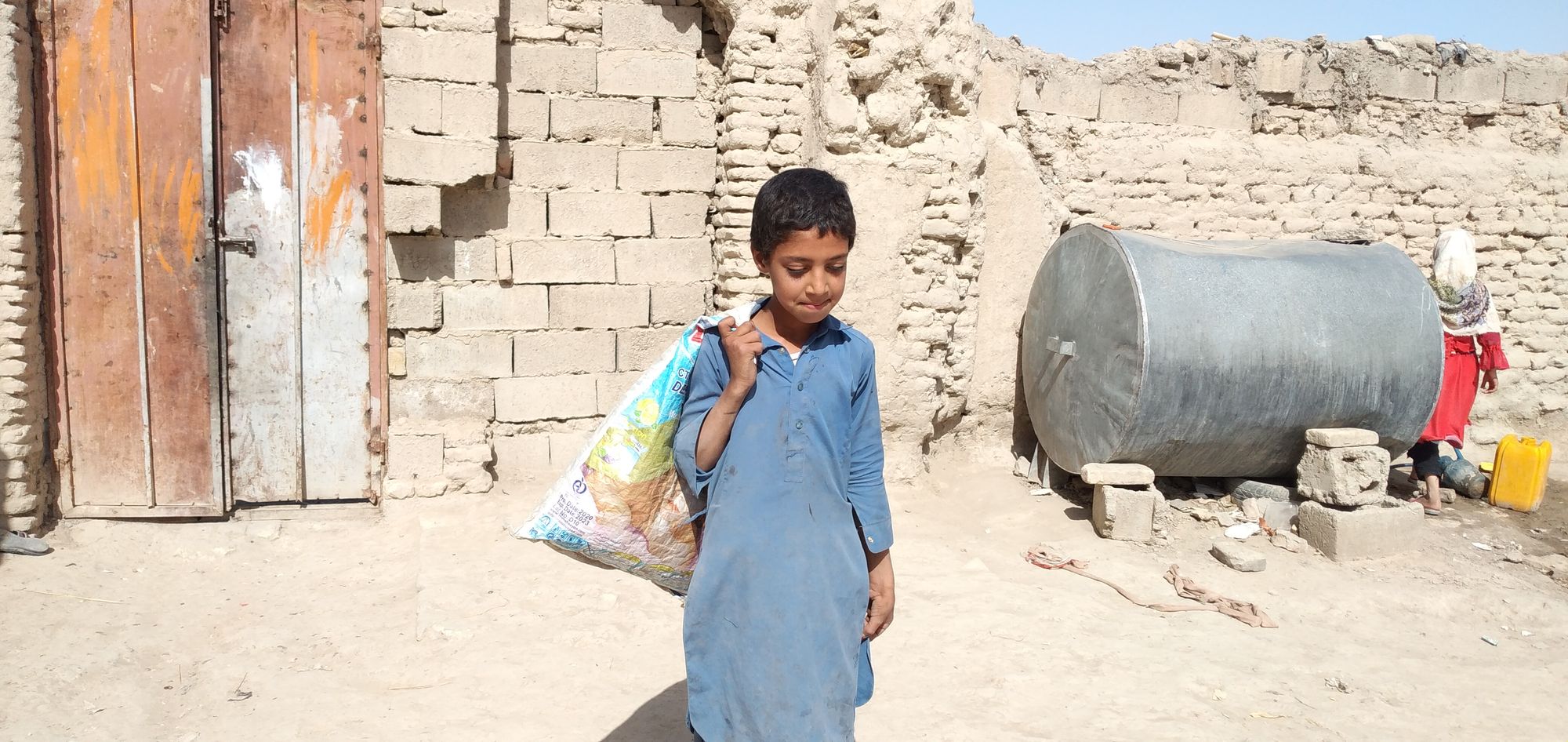
Her one year-old starts crying while she is washing the clothes, so Firoza takes the baby and asks Farzana to take care of her. It takes about 50 minutes to wash all the clothes, after which she puts them on the line of rope in the yard to dry in the sun.
After a while Nasir returns from his aunt’s house and asks for food. Firoza reheats some leftover rice from last night while the mice continue playing around their small kitchen. She goes to get a tablecloth and bread to bring for the other children. In a corner of the yard there is a large can covered with a wet mesh to keep the drinking water cool. Feroza takes some water from the can, then opens a pot and fishes for some bread wrapped in linen within the pot. Only two pieces of bread were inside the pot and the linen looks like it hasn’t been washed for a month.
She takes out one platter of rice for the six older children, then feed Suhaila herself. I asked her if she received any sort of assistance from the aid distributed by the United Nations.
“I was at work when they distributed cards the last time. They had come to our house for a survey but the children didn’t understand what the staff were asking for so they went away. But one of the friends who I work for has put my name on their list so they will give me an aid ID,” Firoza tells me.
Firoza is also helped by the people she works for occasionally, in addition to her usual salary. Her daily income is around 300 Afghanis ($3.36 currently).
It’s now 12:30 pm, Firoza feeds Suhaila then puts her into a makeshift hammock near the window but Suhaila fails to fall asleep because of all the noise the other children are making. Firoza and Pari prepare to pray while I leave to visit a friend nearby.
I return to Firoza’s home around 2 pm, not seeing Qadir, I ask where he is.
“We do not have anything to eat at home, so he has gone out to beg for bread near one of the bakeries. He may return by evening or sooner,” Firoza said.
Firoza borrowed money from relatives to send Zahir, her oldest son, to Iran around 8 months ago but Zahir must work to pay back the loan first before he is able to send money home.
“Zahir is a child, I however had no choice but to send him away,” Firoza said as she feeds her baby, adding that, “I worry about him, what if he is arrested by Iranian police and deported? How would I pay back the loan? I cannot sleep because of this,” Firoza says.
Nasir now does what Zahir used to do, collect scrap plastic and metal and sell them. “Sometimes he refuses to go so I beat him,” Firoza says as Suhaila begins falling asleep.
According to a survey published in February, Save the Children, a Britain-based NGO, estimated that more than one million children in Afghanistan are engaged in child labour.
“A survey of 1,400 households across seven provinces of Afghanistan found that 82% of Afghans have lost income since the collapse of the former government and transition of power last August, with 18% reporting they had no choice but to send their children out to work,” Save the Children said. A world population dashboard by the United Nations Population Fund (UNFPA) says 41 percent of Afghanistan’s 40.8 million population in 2022 was between the ages of 0 to 14.
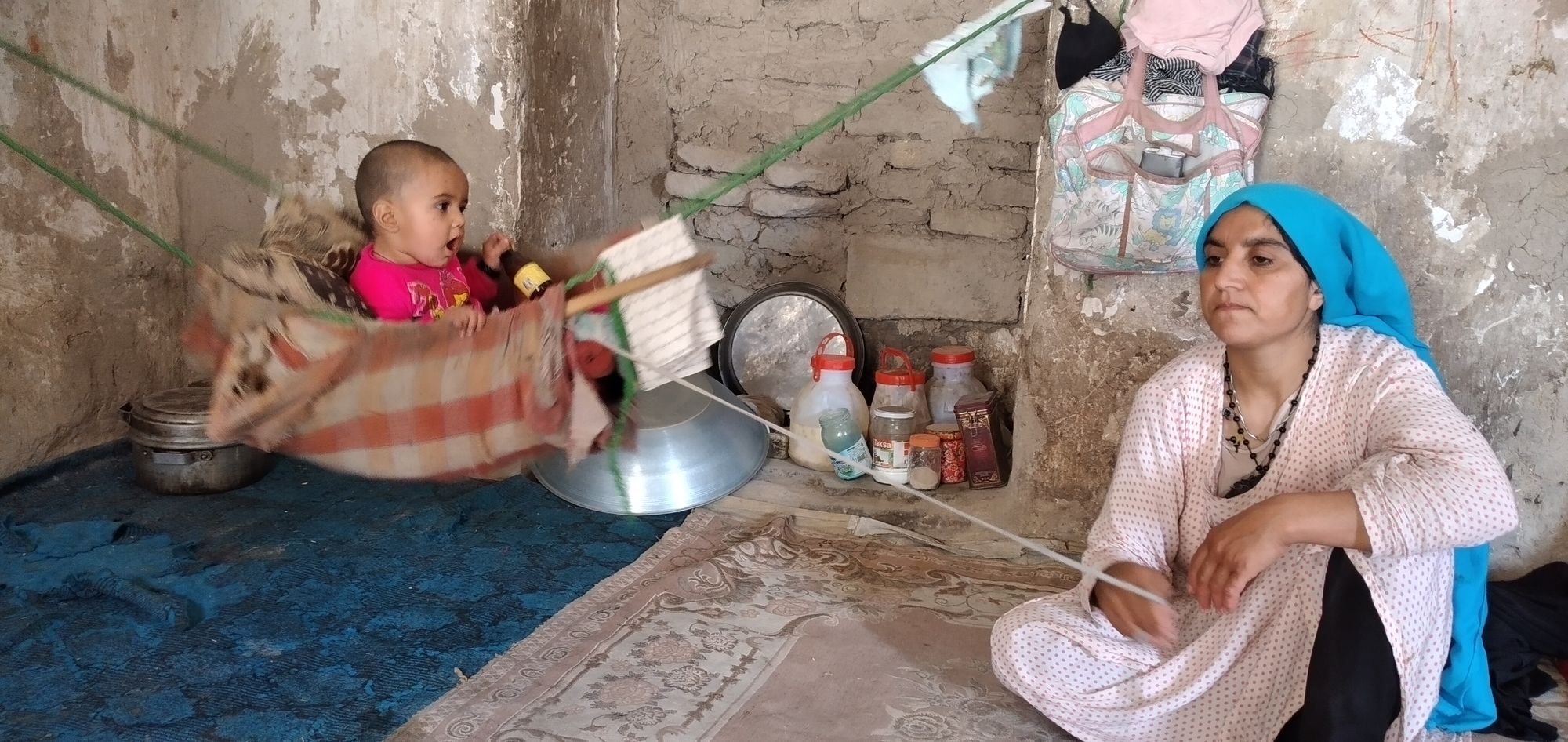
While Firoza is breastfeeding I take the opportunity to photograph their house. Most of the children are playing around in the shade the walls provide but one of the children cannot calm the crying baby she is carrying. The child is the son of Firoza’s sister-in-law who has gone to work.
Although Firoza attempts to calm the child down, the child is hungry and needs to be breastfed, without her mother, that isn’t possible. As a mother, seeing this scene is painful to me, a mother working to feed her family while her child goes hungry.
It’s now 2:40 pm. Firoza and I sit in a corner of her room as Qadir returns holding a piece of bread and gives it to Nasir. Although I ask Qadir for a photograph and interview, he refuses saying he doesn’t want to talk or be seen.
Meanwhile Firoza’s phone rings, the smile on her face after seeing the screen says it must be someone she likes. The call is from Taiba Hashimi, a teacher who always pays Firoza more than her wages.
“I think you have forgotten me, it’s been a long time,” Firoza says into the phone.
“I was a little bit sick and had a trip, I just returned yesterday. Can you clean my house today or tomorrow?” Taiba asks Firoza.
“With pleasure!” Firoza replies happily. Taiba says her mother also needs to wash her carpets and asks if Firoza could help with that too, which she happily accepts. Not waiting at all, Firoza wraps herself in a scarf and exits the house with me on her tail.
The apartment she is cleaning is nice but Firoza is in a hurry to return home as her baby could wake up at any moment. After greeting Taiba, she takes a broom to clean three rooms and the hallway. She starts from the hall then goes room by room.
She sweeps the rooms and shakes the curtains, making sure they are dusted off, then heads to the kitchen to wash the dishes. After she is done, Taiba gives her a small pot with cooked peas inside, two kilos of rice, some dates and 100 Afghanis ($1.12). Firoza then leaves in a hurry, getting back home 10 minutes after we left Taiba’s house.
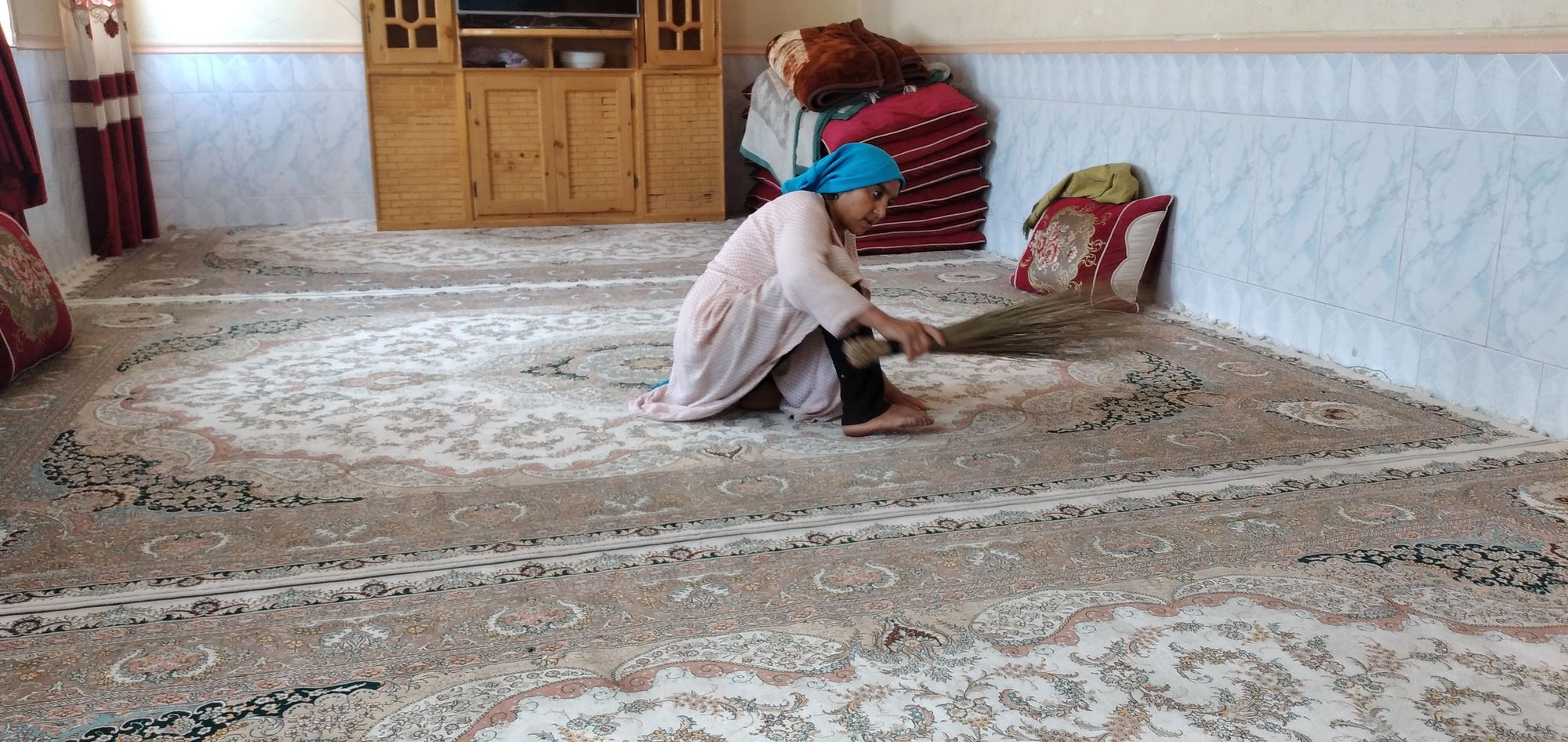
I check my phone, it is 5 pm and we are closing in on the time for Asr prayers. When Firoza goes to work, she usually takes Nasir, Suraya and Suhaila with her so that she can feed them at the houses where she works. If the owner of the house does not want her children to be there, she coordinates with her sister-in-law to stay at home to take care of their children. Whenever there is more work than one person can do, she takes Farzana, Parwana and Nasir with her, and the owner of the house pays separate wages to Farzana and Parwana.
The house they live in is rented at 1,000 Afghanis per month, half of which is Firoza’s share.
It is now 05:20 pm. Firoza leaves the room searching for something in the yard. After finding some plastic, paper and two worn shoes, she lights a fire in the traditional fire pit. She puts a kettle on the fire to boil some water and readies a pot to cook dinner in.
After preparing some tea, Firoza comes back inside the house and starts some embroidery. She is embroidering a man’s dress collar that will earn her 3,000 Afghanis ($33).
“I do this whenever I don’t work outside,” Firoza says, adding that, “I take two painkillers after working at people’s houses so I can rise up the next morning, I don’t have the energy to clean around my own house.”
If you are able to support our work financially, please click the button below.
